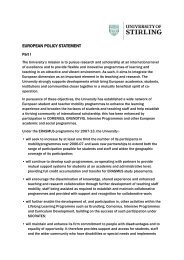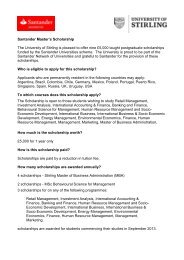Supporting a uK SucceSS Story: The impacT of - Research Councils ...
Supporting a uK SucceSS Story: The impacT of - Research Councils ...
Supporting a uK SucceSS Story: The impacT of - Research Councils ...
You also want an ePaper? Increase the reach of your titles
YUMPU automatically turns print PDFs into web optimized ePapers that Google loves.
past:<br />
HISTORY OF THE OLYMPIC<br />
GAMES AND PARALYMPIC GAMES<br />
This year, London will make history as the only<br />
city to have hosted the Olympic Games on<br />
three occasions. It is an honour which befits<br />
a city that has played such an important part<br />
in helping to support the Olympic movement.<br />
London stepped in to host the 1908 Games at<br />
short notice and held the first Olympic Games<br />
following the Second World War in 1948, at a<br />
time when the world was still at odds. Much<br />
has changed over the last 64 years, but it is<br />
hoped that the 2012 Games will go down in<br />
history as one <strong>of</strong> the best yet.<br />
London: saviour <strong>of</strong> the Modern Olympics<br />
Building upon the legacy <strong>of</strong> the Ancient Olympic Games, since<br />
1896 the Modern Olympic Games has provided an opportunity for<br />
countries to come together regularly in friendly rivalry in the sports<br />
arena, but it has not always been easy. Frequently, the Olympics’<br />
sporting dimension has been qualified, even threatened, by political<br />
and commercial factors.<br />
“Forty years on,<br />
in the summer<br />
<strong>of</strong> 1948, London<br />
took on the<br />
task <strong>of</strong> getting<br />
the Olympic<br />
movement<br />
back on track<br />
again after the<br />
controversial 1936<br />
Berlin Olympiad.”<br />
Peter J. Beck, Emeritus Pr<strong>of</strong>essor <strong>of</strong> History at Kingston University,<br />
has researched Britain’s relationship with the Olympic Movement,<br />
with specific reference to issues arising from hosting the Games.<br />
In 1908 London, although stepping in as host at almost the last<br />
minute, delivered the Games and the first purpose-built Olympic<br />
Stadium. Moreover, Olympism also emerged much strengthened<br />
from London 1908, frequently described as ‘the first true Olympics’.<br />
Forty years on, in the summer <strong>of</strong> 1948, London took on the task<br />
<strong>of</strong> getting the Olympic movement back on track again after<br />
the controversial 1936 Berlin Olympiad and the lengthy gap<br />
following the suspension <strong>of</strong> the Olympics during the Second<br />
World War. London’s task was not helped by post-war austerity<br />
and the beginnings <strong>of</strong> the Cold War, but London 1948 placed an<br />
emphasis on the Olympiad as sporting ‘Games’. During the opening<br />
ceremony held at Wembley Stadium, the scoreboard carried the<br />
famous words <strong>of</strong> Pierre de Coubertin, the founder <strong>of</strong> the Modern<br />
Olympics: “<strong>The</strong> important thing in the Olympic games is not<br />
winning, but taking part. <strong>The</strong> essential thing is not conquering, but<br />
fighting well.”<br />
52<br />
SECTION FIVE : THE GAMES: past, present and future
















